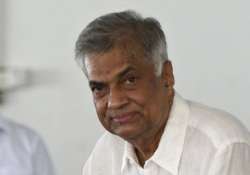Sri Lanka's prime minister sworn in as 2 parties sign deal
Colombo: Sri Lanka's new prime minister, Ranil Wickremesinghe, was sworn in Friday and the island nation's two major political parties — formerly bitter rivals — signed an agreement to work together in the new parliament.Their

Colombo: Sri Lanka's new prime minister, Ranil Wickremesinghe, was sworn in Friday and the island nation's two major political parties — formerly bitter rivals — signed an agreement to work together in the new parliament.
Their cooperation is a hopeful sign in tackling the country's most pressing challenges — national reconciliation after a long and brutal civil war and overcoming the economic hardships borne from the conflict.
Wickremesinghe's victory in Monday's election thwarted a political comeback bid by the country's former strongman president, Mahinda Rajapaksa, seven months after he lost his presidential re-election bid.
Wickremsinghe, a lawmaker since 1977, has already served three times as prime minister, a position second to the president in Sri Lanka. He was sworn in before President Maithripala Sirisena at a ceremony at the president's office where an agreement to cooperate was signed between Wickremesinghe's United National Party and Sirisena's Sri Lanka Freedom Party.
The UNP won 106 seats at the Monday's election, seven short of a majority in the 225-member parliament. But the agreement between the UNP and SLFP, which won 95 seats, will enable Wickremesighe to secure a majority in parliament. Eetails of the new agreement were not immediately released.
The parties have been bitter rivals for decades, and such cooperation is unusual in Sri Lankan politics. An earlier agreement to cooperate between a president and a prime minister elected from different parties ended after bickering.
On Wednesday, Wickremesinghe pledged to build consensus on national policies and invited all political parties to work together, either by accepting a ministerial position or through the parliament committees.
Sirisena broke away from Rajapaksa's Cabinet last year and won an upset victory in the Jan. 8 presidential election with support from Wickremesinghe, who was opposition leader at the time. Rajapaksa's loyalists, however, compelled an unwilling Sirisena to field the former president in the parliamentary election.
In Sri Lanka, the prime minister acts for the president when he is absent and replaces him if he is impeached, incapacitated or dies. The president has wide executive powers and usually holds the defense, foreign relations and sometimes finance portfolios. The prime minister heads lawmaking and has some governance powers.
Rajapaksa accepted the results and announced that he will continue to engage in politics.
Since his presidential loss, there has been a sharp reversal of fortunes for Rajapaksa, his family and friends, who were once all-powerful controllers of the nation. Some now face investigations or lawsuits on allegations of corruption, misuse of power and even murder.